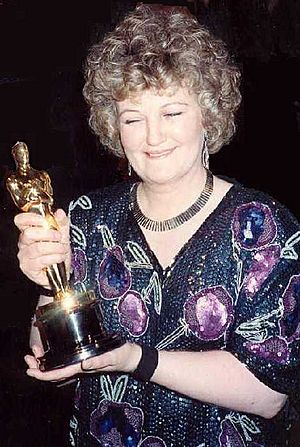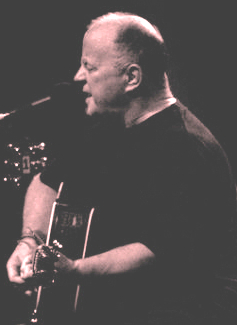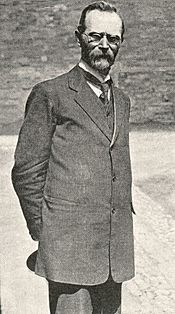1945 in Ireland facts for kids
Quick facts for kids
|
|||||
| Centuries: |
|
||||
|---|---|---|---|---|---|
| Decades: |
|
||||
| See also: | Other events of 1945 List of years in Ireland |
||||
The year 1945 in Ireland was a time of big changes. World War II was ending, and Ireland saw new leaders, important events, and the return of some everyday things. Even though Ireland stayed neutral during the war, the end of it still brought many changes.
Contents
Leaders in 1945
In 1945, Ireland had several important leaders:
- President of Ireland:
- Douglas Hyde was President until June 24, 1945.
- Seán T. O'Kelly became the new President on June 25, 1945.
- Taoiseach (Prime Minister): Éamon de Valera from the Fianna Fáil party.
- Tánaiste (Deputy Prime Minister):
- Seán T. O'Kelly until June 14, 1945.
- Seán Lemass from June 14, 1945.
- Minister for Finance (in charge of the country's money):
- Seán T. O'Kelly until June 14, 1945.
- Frank Aiken from June 19, 1945.
- Chief Justice (head of the courts): Timothy Sullivan.
- Dáil Éireann (Irish Parliament): The 12th Dáil was in session.
- Seanad Éireann (Irish Senate): The 5th Seanad was in session.
Key Events of the Year
Many important things happened in Ireland during 1945:
- January 1: Most public transport, like buses and trains, came under the control of a new company called Córas Iompair Éireann.
- January 12: The people of Ireland showed great kindness. They donated £1,000,000 to help people who were starving in Italy.
- April 13: The Dáil Éireann (Irish Parliament) met for a short time. They wanted to show their sadness and respect for the US President Franklin Delano Roosevelt, who had died the day before.
- May 2:
- A controversial event happened when Taoiseach Éamon de Valera visited the German Ambassador. He went to express sympathy after the death of Adolf Hitler, which caused much discussion.
- Sadly, the Naom Garvan, a fishing boat, hit a naval mine. This was the last Irish ship lost due to World War II. All three crew members were lost.
- May 7: When news of Germany's surrender spread, students at Trinity College Dublin celebrated. Some even sang national anthems on the university roof. A small riot happened after an Irish tricolour flag was burned.
- May 11: The government stopped wartime censorship of the media. This meant newspapers and radio could report more freely.
- May 16: Éamon de Valera spoke on the radio. He replied to British Prime Minister Winston Churchill's comments about Ireland staying neutral during the war.
- May 18: Éamon de Valera announced a large aid program. Ireland would send £12 million worth of food and clothing to help people in Europe.
- May 22: A new law, the Irish Legal Terms Act, was signed. It aimed to help use more of the Irish language in the legal system.
- June 14: Seán T. O'Kelly was elected President of Ireland. He won against Seán Mac Eoin and Patrick McCartan.
- June 25: Seán T. O'Kelly officially became the second President of Ireland.
- July: The Oireachtas (Irish Parliament) translation service published a handbook. It was about the official standard for Irish spelling.
- July 24: A future American president, John F. Kennedy, visited Dublin. He was a young reporter at the time, on a two-day visit.
- July 25: John Kennedy interviewed Taoiseach Éamon de Valera. They talked about the division of Ireland. Kennedy wrote a story about it for a newspaper.
- August 21: Two nationalist Members of Parliament (MPs) took an oath. They then entered the Parliament of the United Kingdom in London.
- December 3: For the first time since World War II ended, oranges went on sale in Ireland.
- December 14: The Nuremberg Trials were happening. They heard about German plans to cause a revolution in Ireland during the war.
- December 25: In his Christmas message, President Seán T. O'Kelly asked young people in Ireland to help bring back the Irish language.
- A "popular edition" of the Constitution of Ireland was published. It included updates to the Irish language text.
Arts and Literature
- J. Sheridan Le Fanu's book, Green Tea and Other Ghost Stories, was published in the United States after he had passed away.
- Ina Boyle's first symphony, Glencree, was performed completely for the first time. This happened at a Raidió Éireann studio concert.
- E. J. Moeran's Cello Concerto included parts of Irish music.
- A new Irish language publisher, Sáirséal agus Dill, was started in Dublin.
Sports Highlights
Football
- League of Ireland: The winners were Cork United.
- FAI Cup: Shamrock Rovers won the cup, beating Bohemians 1–0.
Golf
- The Irish Open golf tournament was not played. This was due to "The Emergency," which was Ireland's name for World War II.
People Born in 1945
Many notable people were born in Ireland in 1945:
- January 8: Kevin Conneff, a bodhrán player and singer with the famous band The Chieftains.
- January 12:
- Tony Maher, a hurler from Cork.
- Eddie O'Brien, another hurler from Cork.
- February 2: Billy Morgan, a Gaelic footballer and manager from Cork.
- February 17: Brenda Fricker, a well-known actress.
- March 17: Paddy Mulligan, a soccer player.
- May 7:
- Susan Denham, who became the Chief Justice of Ireland.
- Christy Moore, a very popular folk singer.
- June 1: Niamh Bhreathnach, a politician who became Minister for Education.
- June 23: Paul Costelloe, a famous fashion designer.
- August 3: Eamon Dunphy, a footballer, commentator, and broadcaster.
- September 12: Maria Aitken, an actress, writer, and director.
- December 8: John Banville, a famous novelist.
People Who Passed Away in 1945
Some important people in Ireland died in 1945:
- July 24: Kitty Kiernan, who was engaged to the famous Irish leader Michael Collins.
- October 15: Eoin MacNeill, a scholar and nationalist. He helped start the Gaelic League and the Irish Volunteers.
- December 6: Edmund Dwyer-Gray, a politician who was Premier of Tasmania in Australia.
Black History Month on Kiddle
Prominent African-American Labor Activists
 | Isaac Myers |
 | D. Hamilton Jackson |
 | A. Philip Randolph |

All content from Kiddle encyclopedia articles (including the article images and facts) can be freely used under Attribution-ShareAlike license, unless stated otherwise. Cite this article:
1945 in Ireland Facts for Kids. Kiddle Encyclopedia.




